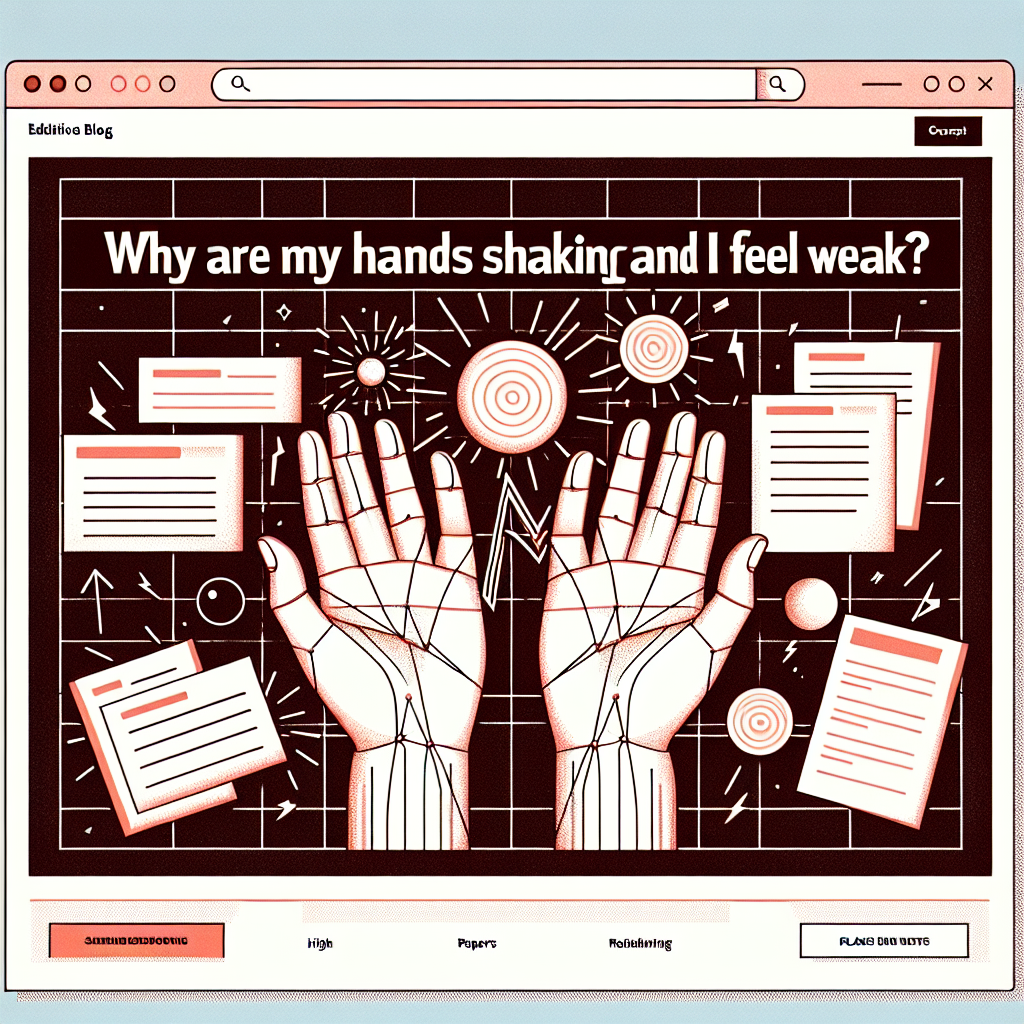Feeling unexplained trembling and low energy can be alarming. If you’ve searched why are my hands shaking and i feel weak, you’re not alone — many people notice this combination of symptoms and want to understand what’s happening and what to do next. Tremor with weakness can come from a wide range of causes, from temporary stress responses to medical conditions that need treatment.
Why do my hands tremble and feel weak?
Shaking hands and a sense of weakness may result from several overlapping mechanisms. A temporary surge of adrenaline from anxiety or a panic attack can cause both tremor and lightheadedness. Low blood sugar (hypoglycemia), dehydration, exhaustion, certain medications, and caffeine or alcohol withdrawal are common reversible causes. More persistent or progressive shaking could point to neurological conditions like essential tremor or Parkinsonian disorders. If you’ve wondered what does it mean when your hands shake, consider whether the shaking is episodic or constant, whether it worsens with movement, and whether other symptoms like slowness, stiffness, or numbness are present.
Common and reversible causes
- Acute stress or panic — adrenaline-driven tremor and weakness
- Low blood sugar — often causes shakiness plus weakness or sweating
- Caffeine, nicotine, or medication side effects — stimulants heighten physiological tremor
- Fatigue, overexertion, dehydration — simple metabolic causes
Social and observational cues matter too. When you see people hand shaking in public, it’s not always a sign of a serious illness; often it reflects temporary stress, cold, or caffeine. Still, persistent or worsening tremor should prompt medical evaluation.
How anxiety and lifestyle influence shaking
Anxiety commonly produces symptoms people describe as “why are my hands shaking and heart beating fast” — an increased heart rate plus visible trembling. If shaking happens primarily in stressful situations, behavioral strategies can help. Simple breathing exercises, sleep hygiene, reducing stimulants, and a short digital break can reduce overall arousal. For guidance on cutting down digital stressors that can fuel anxiety and distraction, see digital detox: how to reclaim your focus and reduce anxiety.
Neurological and medical conditions to consider
When tremor is chronic or accompanied by other neurologic signs, medical causes deserve attention. Essential tremor typically causes action tremor that worsens with movement or purposeful use of the hands. Parkinson’s disease often produces a resting tremor plus slowness and stiffness. Thyroid overactivity (hyperthyroidism) can lead to shakiness and fatigue. If you ask yourself “when your hands are shaking does that mean your scared,” remember that fear is one possibility — but not the only one.
If you wake to tremor, consider the phrase why do my hands shake when i wake up: morning tremor can appear in people with certain metabolic imbalances, withdrawal syndromes, or medication timing issues.
When to seek medical care
Seek prompt care if tremor is sudden, severe, associated with fainting, chest pain, confusion, difficulty speaking, or focal weakness. Also see your clinician if shaking is progressive, interferes with daily activities, or you have persistent questions like why are my hands always shaky. Primary care clinicians can perform basic testing (blood sugar, thyroid tests, medication review) and refer to neurology when indicated. For an authoritative overview on tremor types and evaluation, refer to the National Institute of Neurological Disorders and Stroke’s tremor resource: NINDS tremor overview.
Practical first steps you can take
- Check recent caffeine, alcohol, or drug intake and medication changes.
- Measure blood sugar if you have diabetes or skipped meals.
- Stay hydrated, rest, and try slow diaphragmatic breathing to calm the nervous system.
- Track when tremor occurs (time of day, triggers, duration) to share with your clinician.
Short FAQ
Q: Can stress alone make my hands shake?
A: Yes. Stress and anxiety commonly cause a sympathetic surge that produces tremor and a sense of weakness; however, persistent shaking should be evaluated to exclude other causes.
Q: Could medicines or withdrawal be the cause?
A: Absolutely. Many medications and withdrawal from substances (including caffeine or alcohol) can cause tremor. Review recent changes with your provider.
Q: Is shaking always a sign of a neurological disease?
A: No. While conditions like essential tremor or Parkinson’s can cause shaking, common non-neurological factors (metabolic, medication-related, or emotional) are frequent causes. If you’re asking what does it mean when your hands shake, remember context and associated symptoms guide the diagnosis.






